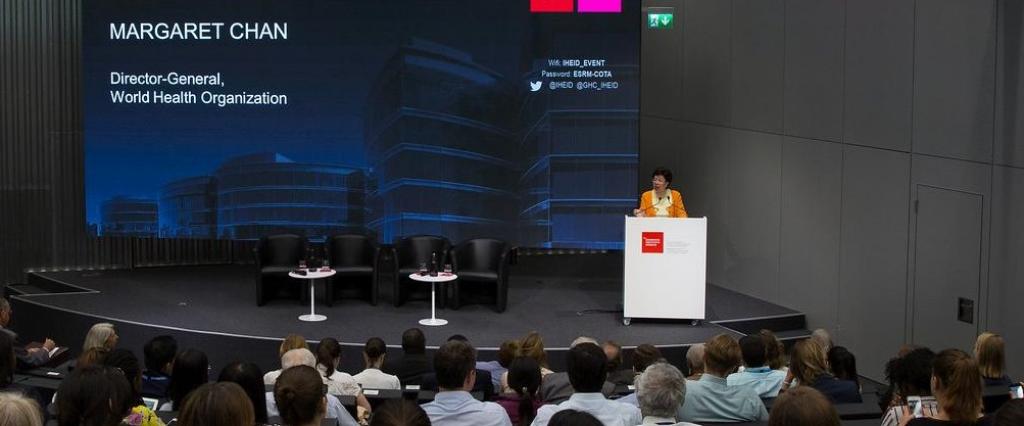“From breakthrough to breakthrough”, these are the words used by Tania Dussey-Cavassini, Vice Director General and Ambassador for Global Health at the Swiss Federal Office of Public Health, to describe Margaret Chan’s tenure as Director-General of the World Health Organization (WHO). The public event celebrating Dr Chan’s leadership on global health, organised by the Graduate Institute and its Global Health Centre on 27 June 2017, highlighted the significant transformations the global health sector has gone through in the past decade. Health has moved from a development to a security, economic, and environmental issue. Universal health coverage, noncommunicable diseases, antimicrobial resistance, neglected tropical diseases, and primary healthcare are now higher on the international agenda and were championed by Margaret Chan during her tenure.
Of the many challenges that have marked the last decade, particular attention was given to disease outbreaks and the role of the WHO in emergencies. Elhadj As Sy, Secretary General of the International Federation of Red Cross and Red Crescent Societies, reminded how Dr Chan always put people at the centre and advocated to go beyond the medical response to include social scientists and anthropologists. Yvette Stevens, Ambassador and Permanent Representative of the Republic of Sierra Leone in Geneva, also spoke of Margaret Chan’s leadership in this area, underlining that “a successful woman is one who can build a firm foundation with the bricks that others have thrown at her”.
By walking the talk in women’s leadership in global health, Dr Chan emphasised the gender dimension of health interventions. Her focus on women’s and girls’ health has, inter alia, allowed reversing the trend of under-delivery in the reduction of preventable maternal and infant mortality. As a rollback on sexual and reproductive rights threatens this legacy, educating girls and empowering women remain crucial for sustainable health gains.
These and other breakthroughs were achieved in a context characterised by uncertainty and crises, including financial crisis, food crisis, health and humanitarian crises, unprecedented movements of people, and violence against women and healthcare workers. Under these circumstances, Deputy High Commissioner for Human Rights Kate Gilmore reiterated the importance of evidence for effective decision-making and accountability, and the right of everyone to enjoy the benefits and fruits of science. Dr Chan always reinforced a view of health as both a fundamental human right and a result of human rights by fostering an understanding of health as the bedrock of sustainable and inclusive societies.
Other breakthroughs in global health were attained through negotiations with, and among, Member States. Trust, flexibility, and creativity are necessary to find a consensus and move issues forward. International Geneva is a privileged place to advance health and its determinants. Michael Møller, Director General of the United Nations Office at Geneva, underlined how Geneva has become the health capital of the world and the key role played by Margaret Chan in this transformation by bringing together stakeholders across sectors.
Notwithstanding the achievements of the past ten years, it was pointed out that more progress is needed in areas such as WHO governance reform and polio eradication. Challenges related to obesity, ageing, and health financing will shape the global health landscape in the next years. Despite complexity and uncertainty, Margaret Chan’s message is clear: investing in health will tackle inequalities, foster social cohesion, and ensure a healthy and productive population.


